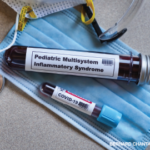Dr. Niewold’s group hypothesized that common gain-of-function IFN pathway SLE risk alleles would be associated with protection from mortality in acute COVID-19. The group collected genomic data from 1,149 COVID-19 positive patients and studied single nucleotide polymorphisms in IFN pathway genes in which gain-of-function properties in humans have been previously reported. They then compared in-hospital mortality from acute COVID-19 between genotype groups for the various IFN pathway SLE risk alleles. The findings of the study indicate that a number of IFN pathway lupus risk alleles significantly impact mortality following COVID-19 infection, with certain alleles showing associations with decreased risk of mortality in patients with these alleles compared to patients without these alleles.
These findings have led to two important outcomes: 1) the development of multivariate prediction models that combine genetics and known biomarkers of disease severity to accurately predict mortality in acute COVID-19, and 2) an appreciation for how type I IFN pathway risk alleles for autoimmune disease may persist in high frequency in humans due to immune system benefits in protecting against viral infections.
New-Onset IgG Autoantibodies
The subsequent abstract was presented by Sokratis Apostolidis, MD, rheumatology fellow at the University of Pennsylvania in Philadelphia, on the subject of new-onset IgG autoantibodies detected in patients hospitalized with SARS-CoV-2 infection. After several early reports indicating the presence of potential autoreactivity in COVID-19 patients, Bastard and colleagues showed that greater than 10% of a cohort of patients with life-threatening COVID-19 pneumonia had neutralizing IgG autoantibodies against IFN.8
With this in mind, Dr. Apostolidis and colleagues sought to provide a reference map for common autoantibodies and anti-cytokine antibodies in patients with moderate to severe COVID-19 and to examine the extent, breadth and de novo generation of these autoantibodies.
Their study found that 49% of patients had at least one connective tissue disease-associated autoantibody (the prevalence of these autoantibodies in healthy controls was 13%) and that 89% of patients with moderate to severe COVID-19 had at least one anti-cytokine autoantibody, with type I IFN being the most common target.
In the question and answer segment of the talk, Dr. Apostolidis noted that it is unclear if such autoantibody production is entirely unique to COVID-19 or if similar processes occur with other viral infections. He explained that we now have a wealth of information on this subject for the SARS-CoV-2 virus, but that one future direction for research should be to expand such studies to other viral infections.



